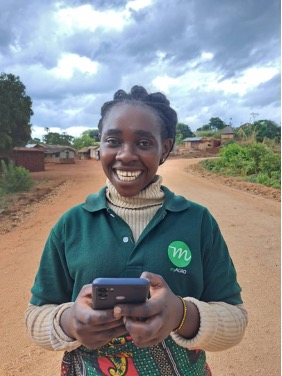Strong impact for farmers and youth from a first-of-its-kind partnership in Tanzania
This article originally appeared on CARE International’s website. Read the original here.
“The money I earn will be invested in agriculture activities especially on sunflower and maize farming,” she said. “I am a good farmer and I really want to increase my yield and income.”
Rozalia Joseph is a teacher, mother, farmer, and a CARE Community Based Trainer (CBT) who also earns money through myAgro’s Village Entrepreneur (VE) model. Since joining, she has earned enough commission to support her farming activities, which will provide income and nutrition for her family.
Rozalia is part of a pilot launched in mid-2022 between myAgro and CARE International that seeks to help address challenges that smallholder farmers face. The partnership centers on supporting smallholder farmers from the Ludewa area of Tanzania, helping address four key challenges: access to good agricultural inputs, access to agronomic training, linkage to markets, and increased food security amidst a growing global food crisis.
Initially, the pilot aimed to reach 1,000 smallholder farmers in six months but exceeded this goal, delivering to over 1,200 farmers after only four months, all of whom received training from CARE and myAgro. Of this initial group of farmers, 57% are women. Importantly, delivery will contribute to increased food security and improved nutrition, thanks to the increased availability of okra and groundnuts.

The pilot has empowered Rozalia to not only increase her income, but her professional skills as well, including community engagement skills, sales pitching, and public speaking. All of which she plans to use to build her future career.
“Before joining the program, I was afraid to speak in public, but thanks to the skills and training I received, I can now speak in public with confidence,” Rozalia exclaimed. “My dream is to become a large business women especially for Vitenge [a fabric used for clothing].”
Her role not only supports herself and her family but her entire community. In Rozalia’s village, inflation has caused a shortage of cash for many farmers—a reality for many across the globe struggling to meet their needs.
“I see a lack of money for purchasing inputs on time. This makes farmers panic during planting times due to lack of enough money for input purchasing.”
Rozalia sees this partnership as an opportunity to combat poverty in her community. “This is the first time we have received a program like this,” Rozalia shared. “One of the significant benefits for my village is the inclusion of a sunflower package that will result in increasing farmers’ income when selling the sunflower oil.”
myAgro delivers seed packages directly to rural villages, providing access to farmers in hard to reach areas. And both organizations are helping rural Tanzanians earn more money: CARE’s market linkages mean that farmers get more money for their harvest, especially sunflowers, while myAgro gives CBTs, who are volunteers, a form of income in the commission that they earn helping farmers buy packages.
Building on the existing trust and solidarity that savings groups have with each other helps the whole process move faster and more successfully. “Working with a CBT and establishing demo plots were immediate motivators for me to join myAgro.” Eva, one farmer in the program, shared. “The CBT is a VSLA group member, so I trust him.”
The partnership plays to each organization’s key strengths by tapping into an existing network of farmers in the VSLAs and leveraging existing infrastructure, including myAgro’s delivery mechanism. As well, the pilot had critical buy-in from governmental stakeholders. Government leaders welcomed the project in person, which helped build trust with the community. Leaders encouraged farmers to enroll, provided trained agriculture extension officers, and made villages bylaws that favored enrollment.
Leveraging the strengths of each organization, and the excitement of those in the Ludewa area, made the pilot of this project successful and sets the stage for expansion that will reach even more farmers in Tanzania and connect them to income, agricultural inputs, training, and market linkages.